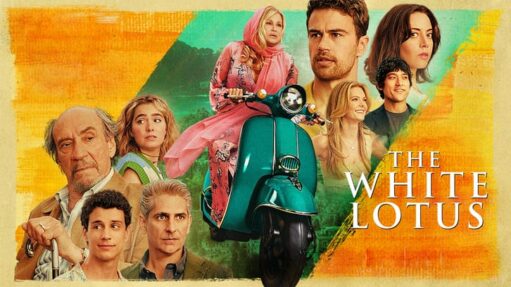I won’t tell you what happens in the finale, if you haven’t seen it yet.
But you might want to stay off YouTube, Twitter and the internet in general if you’re trying to avoid finding that out.
Because this second season (with all new characters except two) of Mike White’s hybrid HBO limited series captured the public’s imagination.
I want to talk about why, and what lessons it holds for us writers. Because it’s not only been wildly popular, it also won Emmies last year for Outstanding Limited Series as well as for writing, directing, music, two supporting actors, etc.
And I wouldn’t be surprised to see similar results this fall.
I’m going to avoid spoilers by talking more generally about themes and characters, giving away only what the show is generally exploring and not specific plot developments.
Other than what you’d know from watching the very first scene. Which is…
Somebody dies.
Like the first season, that’s teased at the top and the audience is left wondering until the final episode who it is and how/why it happened. Was there a murder? Or more than one? Who of the people we’ve come to know killed or were killed?
In my book and online course inspired by it, both called The Idea, I talk a lot about the 7 elements of a strong story, using the acronym PROBLEM.
“E” is for Entertaining, and Mike White gives the audience one of the most tried and true entertainment-providers in TV history: the question of how someone died.
Rather than focus on a detective trying to solve that mystery, however, it makes the audience the detective in terms of both who might have killed and who got killed, and you’re constantly wondering which of these people and relationships could be pushed to that end. There are many possibilities, and it’s part of the fun of watching to know things are spiraling in that direction, but to not know exactly how.
So he’s providing a desirable emotional experience with that. He’s also doing it with the gorgeous settings (and people), and the vicarious view into the lifestyles of the rich.
Plus a variety of attention-grabbing plot situations, surprises, and comedic character interactions that makes it all like “candy” to watch. With amazing music, cinematography, costumes, etc. It’s a big entertainment package.
And it’s delivered in an Original way that somehow all feels real, or Believable. (The “O” and “B” in “PROBLEM.”)
He also Punishes the characters (“P”) relentlessly – have you ever met a more miserable bunch of people? Who have strong desires and can’t get what they want, or who think they can, for a while, but then it turns another way? And who are facing Life-Altering stakes (“L”) such as death, divorce, wasted lives, etc.?
To me the show is first-rate across all these metrics.
But the two I really want to talk about are “Relatability” and “Meaningfulness” (“R” and “M”). Because it’s truly a master class in these two elements.
Relatability
This is about the audience emotionally identifying with characters. In a series, you generally need multiple characters the audience strongly bonds with, who have something they want and can’t have, that’s made clear early on, and which they struggle with, throughout. An active source of conflict. Or as Aaron Sorkin might say, “Intention meeting Obstacle.”
The White Lotus in both seasons doesn’t make it easy to relate to everyone. It doesn’t present wholly likable characters. Or for every one person that’s easy to love, there are 8 that aren’t. For one reason or another.
And yet…
As time goes on, the sands shift enough to where you find reason to sympathize with almost every central character, on some level. There is some basic pain, or unmet desire, or problematic situation that you find yourself identifying with. That they’re actively dealing with, in virtually all of their scenes.
You might not forgive everything about how they treat others or what they’ve done, but you can’t help but feel for them on a human level, around some central problem they have.
Meaningfulness
In my first course lesson on this topic, I talk about “rich themes” in terms of competing values, where there’s no easy, facile answer or statement being made.
And that’s where I think Mike White most shines.
The White Lotus is really about something. It chews on intriguing thematic questions and views them through the lens of multiple characters and relationships, showing a variety of potential positives and negatives on all sides of an issue.
He’s exploring, not telling an audience they must think X about something.
In an interview with Katie Couric, he said the first season was about how “who has the money” affects relationships.
Certainly the person with more money tends to have more power, but it’s played out in so many interesting plot developments through so many different relationships, that it feels more like we’re seeing a kaleidoscope of ways that can manifest, not one obvious blanket statement.
In Season Two, it’s more about sexual desires and their role in the power dynamics between people. In an intoxicating variety of situations, he delves into wildly different characters and couples and the sexual dynamics that define them.
And while some characters might come off as less likable and seem more “wrong” than others, it’s never black and white.
MINOR POTENTIAL SPOILER HERE:
For instance, is it possible that a semi-open marriage with lots of secrets about cheating, that causes suspicions without proof, can actually lead to stronger sexual chemistry between the two people in a couple?
It’s not what you’d expect to be the case, and maybe that isn’t the final word on the issue, but he gives space for the possibility.
He also makes sure that virtually every character has a mix of qualities, desires and approaches — truly complex, three-dimensional characters not defined by any one characteristic. People with layers. That as an audience, you have different opinions about and aren’t ultimately sure what your final conclusions about them are.
So it’s rich, and has a lot of meaning, beyond the surface plot, in terms of human behavior, societal norms, and the lives and relatonships of viewers.
It “sticks to the ribs.”
While at the same time, somehow being wildly entertaining on a surface level.
PROBLEM. Check, check, check, check, check, check, check.
Do you agree? What are your thoughts? Feel free to comment below…



Late to the party, but what I found interesting about this season is that, even with the murder mystery, it didn’t “hook” me until the 4th episode. The first three felt more like voyeurism in a way — these peoples’ lives were interesting and different enough from mine (and I live in Italy), that it was simply fun and beautiful to watch. But all of the minor issues — the little hints and things that were building up, almost unnoticeably, culminated in this brilliant way in episode 4. I had to stick with it, but I was amazed at how, after that point, there was no way I’d stop watching.
Have you ever watched White’s show “Enlightened” with Laura Dern from a decade ago? It was also very good.
I have seen one or two episodes but this does make me want to go back and watch more of ENLIGHTENED. Thanks for the comment!
Thanks for the heads-up on this series, an American friend of mine recommended the series (both) to me, particularly the second one as we both visited those areas 10 years ago. I began watching the first series then moved away as it didn’t particularly grip me immediately but will return once I’ve read this as your last recommendation ‘The Dropout’ was spot on, it was quite brilliant and scary too and the two main protagonists were recently sentenced. Thanks for your logline advice yesterday I am endeavouring to refine it, the story and working on my 15 pages of screenplay and Blake Snyder Beat Sheet, though I am trying to complete a play for an end of January submission too. Thank you.
My pleasure Leslie, look forward to more!